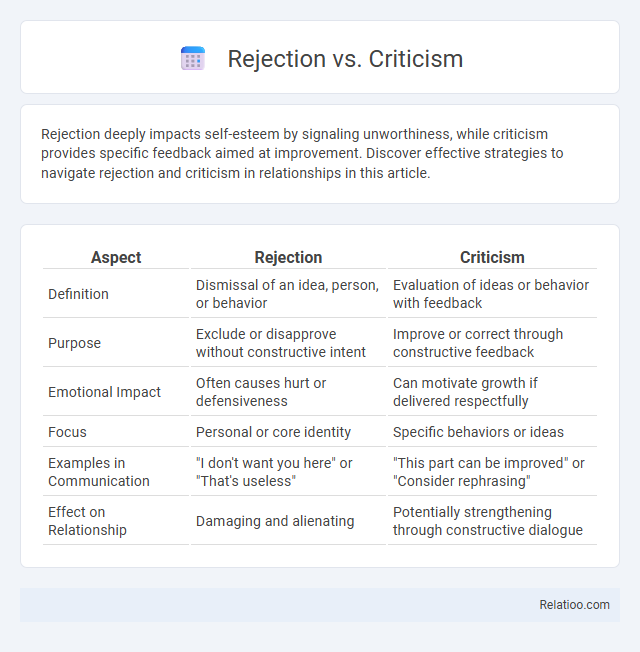Rejection deeply impacts self-esteem by signaling unworthiness, while criticism provides specific feedback aimed at improvement. Discover effective strategies to navigate rejection and criticism in relationships in this article.
Table of Comparison
| Aspect | Rejection | Criticism |
|---|---|---|
| Definition | Dismissal of an idea, person, or behavior | Evaluation of ideas or behavior with feedback |
| Purpose | Exclude or disapprove without constructive intent | Improve or correct through constructive feedback |
| Emotional Impact | Often causes hurt or defensiveness | Can motivate growth if delivered respectfully |
| Focus | Personal or core identity | Specific behaviors or ideas |
| Examples in Communication | "I don't want you here" or "That's useless" | "This part can be improved" or "Consider rephrasing" |
| Effect on Relationship | Damaging and alienating | Potentially strengthening through constructive dialogue |
Understanding Rejection vs Criticism
Understanding rejection versus criticism is crucial for personal growth and emotional resilience. Rejection involves the dismissal or refusal of an idea, proposal, or individual, often triggering feelings of exclusion or failure. Criticism provides constructive feedback aimed at improvement, helping you identify areas for development without negating your value or efforts.
Defining Rejection in Personal and Professional Contexts
Rejection in personal contexts involves the denial of acceptance or approval by others, often affecting emotional well-being and self-esteem. In professional settings, rejection typically refers to the refusal of proposals, job applications, or ideas, impacting career progression and motivation. Understanding these distinctions helps individuals manage responses and develop resilience in diverse social and occupational environments.
The Nature of Constructive Criticism
Constructive criticism is designed to provide actionable feedback that fosters growth and improvement, distinct from rejection, which dismisses ideas or efforts outright. This type of criticism focuses on specific behaviors or outcomes, helping you understand areas for development without attacking your self-worth. Embracing constructive criticism enables you to build skills and enhance performance by transforming feedback into positive change.
Psychological Impact: Rejection vs. Criticism
Rejection triggers intense feelings of worthlessness and social isolation, often leading to decreased self-esteem and increased vulnerability to anxiety and depression. Criticism, when constructive, can promote growth and self-improvement but harsh or unjust criticism may cause defensive reactions and emotional distress. The psychological impact of rejection tends to be more severe and long-lasting compared to criticism, as it challenges fundamental human needs for acceptance and belonging.
Recognizing the Differences: Key Indicators
Rejection involves outright dismissal or refusal, often leaving you feeling excluded or unvalued, while criticism provides constructive feedback aimed at improvement, highlighting specific issues or behaviors. Recognizing the tone and intent behind comments helps differentiate criticism's helpful nature from rejection's emotional impact. Key indicators include whether the message fosters growth or simply invalidates your efforts.
How to Respond to Rejection Effectively
Rejection often triggers emotional responses distinct from criticism, which tends to offer constructive feedback, while judgment passes personal evaluation. Understanding this difference allows you to respond to rejection effectively by separating your self-worth from the refusal and focusing on growth opportunities. Embrace resilience techniques such as reframing the experience, seeking specific feedback, and maintaining a growth mindset to turn rejection into a pathway for personal and professional development.
Turning Criticism Into Growth Opportunities
Criticism, unlike outright rejection, offers specific feedback that can be leveraged to improve skills and outcomes, transforming setbacks into valuable growth opportunities. Embracing constructive criticism enables individuals to identify weaknesses, refine strategies, and foster resilience in professional and personal development. Turning criticism into actionable insights cultivates a mindset oriented toward continuous improvement and adaptive success.
Common Misconceptions About Rejection and Criticism
Common misconceptions about rejection and criticism often blur their distinct purposes and effects, leading many to confuse personal inadequacy with external feedback. Rejection typically signifies a refusal of an idea, offer, or relationship, while criticism aims to provide constructive evaluation to improve performance or behavior. Understanding that rejection is not a reflection of your worth, but a situational outcome, helps you respond more resiliently to criticism and rejection alike.
Strategies to Build Resilience Against Negative Feedback
Facing rejection and criticism challenges your emotional resilience and self-confidence. Developing strategies such as reframing negative feedback as growth opportunities, maintaining a supportive network, and practicing mindfulness enhances your ability to cope with these experiences. Cultivating emotional intelligence and distinguishing between constructive criticism and personal rejection empowers your personal and professional growth.
Embracing Feedback: Pathways to Improvement
Embracing feedback involves distinguishing rejection, criticism, and constructive feedback to foster personal and professional growth. Rejection often feels personal and final, whereas criticism, especially when constructive, provides specific insights aimed at improvement. Understanding these differences enables individuals to leverage feedback effectively, turning challenges into opportunities for development and enhanced performance.

Infographic: Rejection vs Criticism
 relatioo.com
relatioo.com